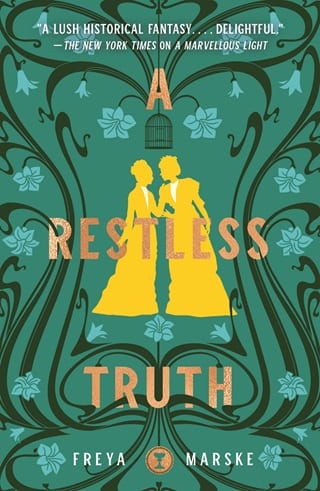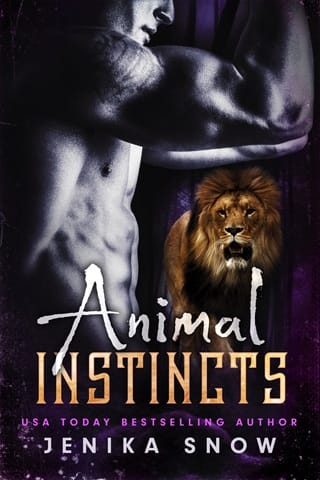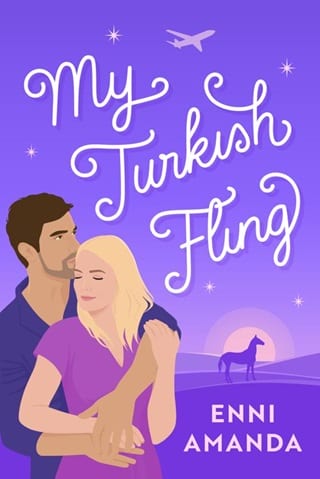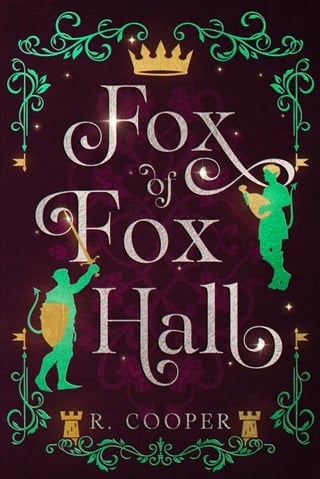Chapter 10
10
Alan Ross the advertising-copy man looked younger when he was unconscious. The sharpness and the smile were both smoothed from his face, and his curls were rough where the cap had come askew when he fell. He looked like a painting by… oh, one of those artists who were obsessed with light and shadow. Robin would have been able to name them at once.
Maud held the face of her pocket watch in front of Ross’s lips again. The glass still fogged. Maud exhaled in relief.
She had thought he was dead at first. It fit the pattern of her luck, as though the universe had looked at Maud’s morning of menageries and new hunger and new friends, and sent her a second corpse as punishment. As if to say: Remember that you failed, and that other people are paying for it.
“He’s not dead,” Hawthorn had said in response to whatever had appeared on Maud’s face when she first entered his cabin. He said it again now, to Violet. “He is, however, the second person to have broken into my room in two days. I can’t help suspecting”—dry as powder—“that the two events may be related.”
Violet came to peer down at the unmoving Ross.
“Fuck,” she said, as easily as if the word were frog or fancy . “It’s that man with the notebook.”
“Alan Ross.” Maud looked at Hawthorn, who was lifting the unstoppered decanter of whisky cautiously to his nose. “You’re sure you don’t recognise him?”
A brief, considering dart of those blue eyes. “No. But I don’t know every magician in the country, Miss Blyth. Especially not the writing ones.”
The working ones, who wore flat caps instead of stiff hats.
“Not dead. Is he asleep?” asked Violet.
“He looks asleep,” said Maud. “But he won’t wake.”
“Are you sure? Stab him with a hatpin.”
Hawthorn said, “I tried shaking him when I found him. But I’ve no objections if you want to stab him as well.”
“ I object!” said Maud, getting to her feet.
“As to what’s wrong with him.” Hawthorn replaced the stopper in the decanter and set it back in place. “Going by the available evidence, I think he’s been poisoned.”
“That’s… something of a leap,” said Violet.
“There was a glass tipped over, with the dregs of spirits in it.” Maud nodded to where she’d set the glass upright and aside. “Some of it had tipped out onto the carpet. I could smell it.”
Hawthorn said, “Can you handle a basic detection-spell, Violet? One with an imbuement focus, if possible.”
Violet stripped off her gloves. “You’ll have to show me the cradles for that focus. My detection-spells run mostly to making sure nobody’s placed any charms in my corner of the dressing room.”
Maud wanted to ask What kinds of charms? and get another of Violet’s anecdotes about theatre life, but she swallowed it. She’d only seen a few people perform magic. Edwin’s technique was, by his own admission, an increasing muddle of the classic English tradition—and he had so little power that he had to use a string to guide his cradles, ensuring the finger positions were exact—and the new one-handed system of magic he was piecing together from Flora Sutton’s research notes.
Catherine Kaur, sister to their friend Adelaide Morrissey, also practiced something out of the ordinary: what she called, dryly, a colonial patchwork of her father’s English techniques and her Punjabi mother’s tendency to combine finger movements with spoken words. “Cradling with the tongue,” Kitty called it, when she wanted Edwin to turn pink with the effort of repressing his endless questions.
Hawthorn demonstrated the detection-spell, slowly, and Violet copied his motions. Each of them drew their palms together and then apart, fingers bending and weaving.
“No, you’ve picked up the American drawl,” said Hawthorn. “This one’s highly contractual, you can’t drop the middle. Sharpen up.”
Violet shot him an unfriendly look, but the motion of her fingers became more precise and angular. “How does the focus clause—oh, I see.”
The spell was visible now. It was dusty grey, as if Violet had dragged her fingers through the ash of an unswept hearth, speckled with tiny flecks that caught the light and glowed. Violet closed the fingers of her right hand around this diamond dust of power, unstoppered the decanter, and made a sharp flicking gesture that deposited the spell into the liquid itself.
The grey vanished at once. Instead the whisky began to twinkle with those same flecks, like a night sky done in burnished amber.
“Magic, not poison. That settles that question,” said Hawthorn. “Or part of it.”
“He imbued your whisky and then drank it himself?” Violet frowned. “That doesn’t seem right. Unless he took a sip as a test and it was stronger than he thought.”
“Or,” said Hawthorn, “he’s a common thief who got himself caught in a trap meant for me, and is in fact the third person to have broken into my room in two days. I should be charging an entry fee.”
Hawthorn’s face was closed-off and hostile. He shook out his right hand as if it had spasmed. Maud wondered what it meant to him, to have abandoned magic years ago and now to be pulled back into performing the empty motions of it, like a chorister reduced to mouthing along with the soaring notes of the chorus.
Maud averted her gaze before he could catch it with his own. She knew when someone was looking for an excuse to strike out.
“You heard about the jewel thief?”
“I had a look through that while I was waiting for you.” Hawthorn indicated something hanging over the back of a chair: Ross’s leather bag. He pulled from his own pocket two small objects, which winked like the stars of the detection-spell. Gold cufflinks, set with what Maud was prepared to wager were diamonds. “These are mine. They were in one of the inner pockets.”
Maud opened the bag herself, heart aflutter. It seemed far too much to hope that the objects stolen from Mrs. Navenby’s room would be inside it. Indeed, most of the bag’s contents seemed to be small pamphlets or slim bound books. Maud pulled out a few. None of the authors or titles were familiar to her. She opened one at random and skimmed her eyes down the page.
Then went back to the top of the page and read more slowly.
“Ah, Miss Blyth—” said Hawthorn belatedly.
“ Goodness .” Maud read several more lines. She opened another of the booklets and read a portion: more of the same, although this one seemed to involve several more participants. When she looked up, Hawthorn had an expression of resigned amusement on his face.
“What is it?” asked Violet. She came and read over Maud’s shoulder: “— that my rod once again swelled, in glorious ecstasy, as I buried my face in her dripping —oh,” and gave a gale of laughter. “If you’re out for whatever you can steal, why would you steal dirty books? They’re not worth half as much as the number of precious knickknacks you could fit in the same space.”
Much as she wanted to keep flicking and reading, Maud gingerly slid the booklets back into the bag.
Hawthorn knelt by Ross’s side and delivered a painful-looking pinch to the webbing of the man’s thumb. Nothing. “Well, at least magic can be reversed.”
“Can it?” said Violet. “Without knowing what kind of imbuement it was in the first place? Enlighten us, my lord.”
“Miss Blyth. Go and get that candle of yours. I want answers when he wakes up, and I want to know they’re true.”
That made sense. Maud did as she was asked.
By the time she returned to Hawthorn’s suite, the others had pushed the furniture back to create more space around Ross’s unconscious form. Violet knelt at Ross’s head and was pouring greenish-gold oil from a small stoppered bottle into an empty whisky glass. Hawthorn stood from the writing desk when Maud entered. He held another piece of notepaper with the White Star letterhead, on which he had drawn several odd-looking symbols.
“Have you worked out how to reverse it?” Maud asked.
Violet made a face. “Not really. This will be the magical equivalent of hurling a bucket of paint blindfolded at a wall and hoping enough of it lands on the individual brick in question. Power in place of precision.”
Maud knew that one; or rather, knew its opposite. Edwin relied on precision to achieve as much as possible with his limited power. A bucketload of magic could afford to be sloppier.
She asked for the details of the spell so that she could write them down for Edwin. Violet explained that olive oil, like other plant oils, took imbuement directly—unlike water or most alcohols, which needed to be steeped with preimbued substances.
“And that?” Maud indicated the sheet of paper.
“I’ve never learned to work with runes,” said Violet. “Apparently, they’re a family speciality for his lordship here.”
Runes. Looking at the dark symbols caused a shiver of memory to dive down Maud’s spine. Robin had borne a rune-curse on his arm, and it had nearly killed him.
Hawthorn brusquely explained his side of the workings. Runes were simply a way of representing the clause or clauses of a spell. You could make them become the whole spell—as with curses, Maud assumed—or use them to hold a complex clause in your mind and reinforce it while you worked on cradling the rest of the spell.
“I still don’t know if it’ll be enough,” warned Hawthorn. “Depends on your strength, Violet.”
Violet brushed a curl back from Ross’s forehead, separating a few thin black strands from the others. She wound these around one finger then jerked it away to pull the hairs out at the roots; Maud winced in sympathy, but Ross didn’t respond any more than he had to Hawthorn’s pinch.
Violet wound the hairs twice more around her finger, creating a loose ring. “It might add something. I’ve seen some specialists use hair as a focus for spells affecting the body. What on earth is that look for? If you can pick America from my cradles, you can’t be surprised at the rings.”
Hawthorn didn’t deign to answer. He disappeared into the adjoining bedroom.
Maud was shaping an Edwin-worthy question about the use of rings in magic, but before she could ask it of Violet, Hawthorn emerged from the bedroom holding an actual handgun.
Maud jerked back. Hawthorn held the gun out, grip-first, in her direction.
“What? Me?”
“Unless you want to be the one showing Miss Debenham how to perform a general negation suitable to imbue an organic oil. In which case, I’ll be more than happy to hold our unwelcome visitor at gunpoint when—God bloody willing—he wakes up.”
Maud flushed. Hawthorn fit the revolver into her hands. It was certainly meant for someone much larger; her fingertip only just touched the trigger.
“What if it goes off by accident?” Maud asked.
Hawthorn gave her a look that spoke eloquently about how little skin off his nose it would be if someone like Mr. Ross was hit by a bullet or two. Maud’s hand, usually very well behaved, felt on the verge of giving an involuntary twitch.
“It’s not loaded,” said Hawthorn.
“Oh,” said Maud. “Good.”
As with the detection-spell, Hawthorn demonstrated and Violet copied. She practiced it several times, each repetition more fluid, until she could do it without watching her fingers. Then she cradled it with true magic, and with her eyes fixed on the sheet of runes. This spell was a red glow. It slipped over the surface of the olive oil, then sank in.
Hawthorn lifted Ross’s head to lie on his knee and opened the man’s mouth so that Violet could tip a portion of the oil inside. Some dribbled out of the corner of Ross’s lips, but Hawthorn pinched them closed and stroked his thumb down the front of Ross’s throat.
Maud was holding her breath. She let it out slowly, the gun an odd weight in her hands, her eyes on Ross’s closed lids.
Nothing.
“I did it correctly,” said Violet, somewhat defensively.
“You did. It should have worked. Hm. Bloodstream’s more drastic, but if that’s what it takes…” Hawthorn lowered Ross and fetched his knife, then coated the blade in the imbued oil.
Violet paled. She looked to the side as Hawthorn made a shallow cut on the back of Ross’s hand that sent bright blood welling to the skin.
“Violet,” said Maud quickly. “Do you theatre magicians put any sorts of imbuement on greasepaint?”
Violet looked at her and resurrected a smile. “You could, but most of the effect would be— Christ! ”
Alan Ross’s uncut hand had flung out and struck her. His whole body jerked and shook. At the end of it his eyes flew open and he rolled to one side, coughing as if to expel grubby fog from his lungs.
Hawthorn stood and stepped over him in a single motion, took the gun from Maud’s unresisting grip, and pointed it down at the now-wheezing Ross with nothing but a flat, bored expression on his face. As if he’d pointed hundreds of guns at hundreds of people. Maud didn’t blame Ross when he looked skittishly among them all and paused like a frozen field mouse as his gaze met Hawthorn’s.
“Welcome back, sir,” Hawthorn said. “You’ve another count of ten to catch your breath, and then you will start talking.”
 Fullepub
Fullepub 



